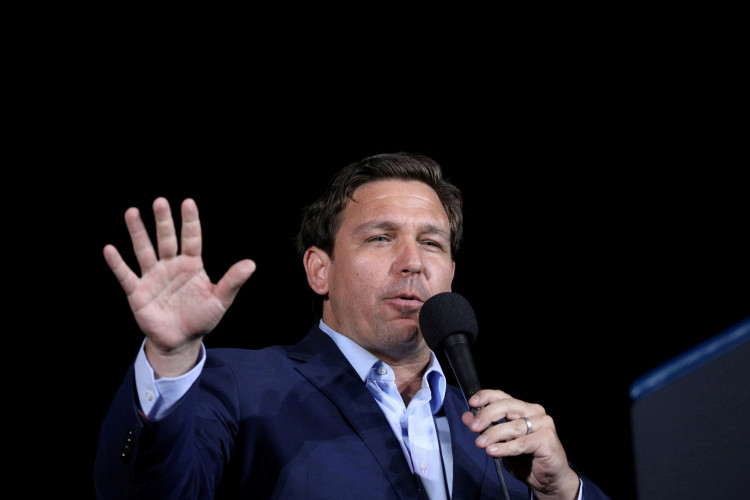Florida Governor Ron DeSantis is mounting an all-encompassing campaign to defeat Amendment 4, a ballot measure that could restore abortion rights in the state. The amendment, which would enshrine the right to abortion in Florida's constitution, represents one of the most contentious political battles in the state ahead of Election Day. If passed, the measure would overturn Florida's current six-week abortion ban, a policy DeSantis championed and signed into law earlier this year.
DeSantis and his administration are using every tool at their disposal to block Amendment 4, from orchestrating public campaigns to leveraging state agencies in efforts that critics say may cross ethical and legal boundaries. As early voting unfolds, with thousands of ballots already cast, the stakes couldn't be higher for both sides of the debate.
The governor's administration has openly campaigned against the amendment, arguing that it threatens women's safety. In a statement defending the state's involvement, Bryan Griffin, a spokesperson for DeSantis, said, "State agencies have the authority and dedicated funding to educate the public on important issues, especially those that impact the health and safety of women and children." This messaging is being reinforced by state-funded public service announcements warning of the dangers associated with abortion and cannabis, which are the subjects of two separate ballot measures in this election cycle.
But the scope of the state's involvement has sparked significant controversy. The Florida Department of Health sent cease-and-desist letters to television stations airing ads in support of Amendment 4, labeling them a "public health nuisance." A federal judge later blocked the state from enforcing the order, ruling that the ads are protected under the First Amendment. The tug-of-war over free speech has further highlighted the lengths to which DeSantis is willing to go to defeat the amendment.
The Republican governor's aggressive actions have drawn criticism from both sides of the political spectrum. State Senator Joe Gruters, a Sarasota Republican, voiced concerns about the use of taxpayer dollars to fund political campaigns. "No matter where you stand on an issue, this is still a democracy, and in a democracy, we do not spend taxpayer dollars in advance of a political issue," Gruters said.
DeSantis, however, remains unfazed by the backlash. His administration has not only employed state funds to run ads against the amendment but also launched websites and other online content aimed at dissuading voters from supporting the measure. The Florida Agency for Health Care Administration created a website warning that Amendment 4 "threatens women's safety." Supporters of the amendment argue that this is misinformation designed to scare voters and filed a lawsuit against the state, though a judge ruled that the court would not interfere with voter interpretation of the amendment.
The fierce opposition to Amendment 4 aligns with DeSantis' broader political agenda. The passage of the measure would directly challenge his conservative "Florida Blueprint," which he has touted in his presidential campaign. Since being elected governor nearly six years ago, DeSantis has expanded the power of the governor's office in unprecedented ways, using executive authority to make sweeping changes to state policies, especially on issues like abortion and education.
The high threshold for passing the amendment-requiring 60% voter approval-presents another significant challenge for supporters. Polls show that while a majority of Floridians support abortion rights, it is uncertain whether the measure will garner enough votes to clear the threshold. "If Florida were practically any other state, it would pass comfortably because it's definitely going to get well above a majority level of support," said Miami pollster Fernand Amandi. "The problem here in Florida is that the threshold is 60%."
Advocates for Amendment 4 have been working tirelessly to build momentum. Planned Parenthood and other organizations backing the measure have ramped up their outreach efforts, knocking on over 600,000 doors and sending millions of text messages to voters. Lauren Brenzel, campaign director for the "Yes on 4" initiative, expressed optimism despite the challenges. "We are still trying to teach people what the actual policy is," she said, noting that many voters are unaware of Florida's strict abortion laws or the narrow exceptions provided under the six-week ban.
Grassroots organizations such as Mi Vecino have focused their efforts on educating Latino voters across the state. Co-founder Alex Berrios said that while awareness of the ballot measure is high, many voters do not fully grasp the six-week abortion ban's implications. "People understand Amendment 4 is on the ballot," Berrios said, "but they don't necessarily connect that there's a six-week abortion ban."
As Election Day approaches, both sides are making a final push. For DeSantis, defeating Amendment 4 would solidify his status as a staunch conservative leader who successfully enacted one of the nation's strictest abortion bans. For supporters of the amendment, however, the vote represents a last-ditch effort to restore reproductive rights in a state where access to abortion has been increasingly curtailed.






